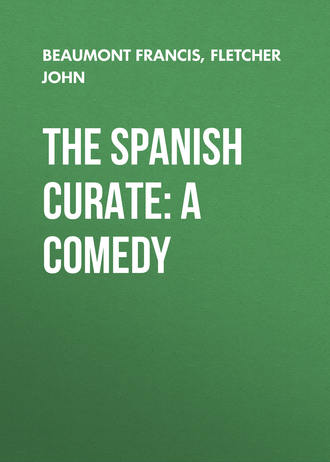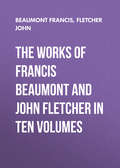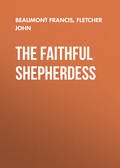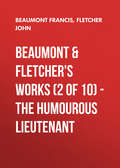
Beaumont Francis
The Spanish Curate: A Comedy
SCENA III
Enter Henrique, and Violante.
Viol.
Is it my fault, Don Henrique, or my fate?
What's my offence? I came young to your bed,
I had a fruitfull Mother, and you met me
With equall ardour in your May of blood;
And why then am I barren?
Hen.
'Tis not in Man
To yield a reason for the will of Heaven,
Which is inscrutable.
Viol.
To what use serve
Full fortunes, and the meaner sort of blessings,
When that, which is the Crown of all our wishes,
The period of humane happiness,
One only Child that may possess what's ours,
Is cruelly deni'd us?
Hen.
'Tis the curse
Of great Estates to want those Pledges, which
The poor are happy in: They in a Cottage,
With joy, behold the Models of their youth,
And as their Root decaies, those budding Branches
Sprout forth and flourish, to renew their age;
But this is the beginning, not the end
Of misery to me, that 'gainst my will
(Since Heaven denies us Issue of our own)
Must leave the fruit of all my care and travel
To an unthankfull Brother that insults
On my Calamity.
Viol.
I will rather choose
A Bastard from the Hospital and adopt him,
And nourish him as mine own.
Hen.
Such an evasion
(My Violante) is forbid to us;
Happy the Romane State, where it was lawfull,
(If our own Sons were vicious) to choose one
Out of a vertuous Stock, though of poor Parents,
And make him noble. But the laws of Spain,
(Intending to preserve all ancient Houses)
Prevent such free elections; with this, my Brother's
Too well acquainted, and this makes him bold to
Reign o're me, as a Master.
Viol.
I will fire
The Portion I brought with me, e're he spend
A Royal of it: no Quirck left? no Quiddit
That may defeat him?
Hen.
Were I but confirmed,
That you would take the means I use with patience,
As I must practise it with my dishonour,
I could lay level with the earth his hopes
That soar above the clouds with expectation
To see me in my grave.
Viol. Effect but this,
And our revenge shall be to us a Son
That shall inherit for us.
Hen.
Do not repent
When 'tis too late.
Viol.
I fear not what may fall
He dispossess'd that does usurp on all.
[Exeunt.
Actus Secundus. Scena prima
Enter Leandro, (with a letter writ out) Milanes, and Arsenio.
Mil.
Can any thing but wonder?
Lea.
Wonder on,
I am as ye see, and, what will follow, Gentlemen?
Ars.
Why dost thou put on this form? what can this do?
Thou lookest most sillily.
Mil.
Like a young Clerk,
A half pin'd-puppy that would write for a Royal.
Is this a commanding shape to win a beauty?
To what use, what occasion?
Lean.
Peace, ye are fools,
More silly than my out-side seems, ye are ignorant;
They that pretend to wonders must weave cunningly.
Ars.
What manner of access can this get? or if gotten
What credit in her eyes?
Lean.
Will ye but leave me?
Mil.
Me thinks a young man and a handsom Gentleman
(But sure thou art lunatick) me thinks a brave man
That would catch cunningly the beams of beauty,
And so distribute 'em unto his comfort,
Should like himself appear, young, high, and buxom,
And in the brightest form.
Lean.
Ye are cozen'd (Gentlemen)
Neither do I believe this, nor will follow it,
Thus as I am, I will begin my voyage.
When you love, lanch it out in silks and velvets,
I'le love in Serge, and will outgo your Sattins.
To get upon my great horse and appear
The sign of such a man, and trot my measures,
Or fiddle out whole frosty nights (my friends)
Under the window, while my teeth keep tune,
I hold no handsomness. Let me get in,
There trot and fiddle where I may have fair play.
Ars.
But how get in?
Lean.
Leave that to me, your patience,
I have some toyes here that I dare well trust to:
I have smelt a Vicar out, they call him Lopez.
You are ne're the nearer now.
Mil.
We do confess it.
Lea.
Weak simple men, this Vicar to this Lawyer
Is the most inward Damon.
Ars.
What can this do?
Mil.
We know the fellow, and he dwells there.
Lean.
So.
Ars.
A poor, thin thief: he help? he? hang the Vicar,
Can reading of an – prefer thee?
Thou art dead-sick in love, and hee'l pray for thee.
Lean.
Have patience (Gentlemen) I say this Vicar,
This thing I say is all one with the Close Bartolus
(For so they call the Lawyer) or his nature
Which I have studied by relation:
And make no doubt I shall hit handsomly,
Will I work cunningly, and home: understand me.
Enter Lopez, and Diego.
Next I pray leave me, leave me to my fortune
Difficilia pulchra, that's my Motto (Gentlemen)
I'le win this Diamond from the rock and wear her,
Or—
Mil.
Peace, the Vicar: send ye a full sail, Sir.
Ars.
There's your Confessor, but what shall be your penance?
Lean.
A fools head if I fail, and so forsake me.
You shall hear from me daily.
Mil.
We will be ready.
[Exeunt Mil. Ars.
Lop.
Thin world indeed!
Lean.
I'le let him breath and mark him:
No man would think a stranger as I am
Should reap any great commodity from his pigbelly.
Lop.
Poor stirring for poor Vicars.
Diego.
And poor Sextons.
Lop.
We pray and pray, but to no purpose,
Those that enjoy our lands, choak our Devotions.
Our poor thin stipends make us arrant dunces.
Diego.
If you live miserably, how shall we do (Master)
That are fed only with the sound of prayers?
We rise and ring the Bells to get good stomachs,
And must be fain to eat the ropes with reverence.
Lop.
When was there a Christning, Diego?
Diego.
Not this ten weeks:
Alas, they have forgot to get children (Master)
The Wars, the Seas, and usurie undoe us,
Takes off our minds, our edges, blunts our plough-shares.
They eat nothing here, but herbs, and get nothing but green sauce:
There are some poor Labourers, that perhaps
Once in seven year, with helping one another,
Produce some few pin'd-Butter-prints, that scarce hold
The christning neither.
Lop.
Your Gallants, they get Honour,
A strange fantastical Birth, to defraud the Vicar,
And the Camp Christens their Issues, or the Curtizans,
'Tis a lewd time.
Die.
They are so hard-hearted here too,
They will not dye, there's nothing got by Burials.
Lop.
Diego, the Air's too pure, they cannot perish.
To have a thin Stipend, and an everlasting Parish,
Lord what a torment 'tis!
Die.
Good sensible Master,
You are allow'd to pray against all weathers,
(Both foul, and fair, as you shall find occasion)
Why not against all airs?
Lop.
That's not i'th' Canons.
I would it had, 'tis out of our way forty pence.
Die.
'Tis strange, they are starv'd too yet they will not die here,
They will not earth: a good stout plague amongst 'em,
Or half a dozen new fantastical Fevers
That would turn up their heels by whole-sale (Master)
And take the Doctors too, in their grave Counsels,
That there might be no natural help for mony:
How merrily would my Bells goe then?
Lop. Peace Diego,
The Doctors are our friends, let's please them well.
For though they kill but slow, they are certain, Diego,
We must remove into a muddy Air,
A most contagious Climate.
Die.
We must certain,
An air that is the nursery of agues,
Such agues (Master) that will shake mens souls out,
Ne're stay for Possets, nor good old wives plasters.
Lop.
Gowts and dead Palsies.
Die.
The dead do's well at all times,
Yet Gowts will hang an arse a long time (Master)
The Pox, or English Surfeits if we had 'em;
Those are rich marle, they make a Church-yard fat,
And make the Sexton sing, they never miss, Sir.
Lop.
Then Wills and Funeral Sermons come in season,
And Feasts that make us frolick.
Die.
Would I could see 'em.
Lop.
And though I weep i'th' Pulpit for my Brother,
Yet (Diego) here I laugh.
Die.
The cause requires it.
Lop.
Since people left to die I am dunce, Diego.
Die. 'Tis a strange thing, I have forgot to dig too.
Lea.
A pretious pair of youths! I must make toward'em.
Lop.
Who's that? look it seems he would speak to us.
I hope a Marriage, or some Will to make, Diego.
Die.
My friend your business?
Lea.
'Tis to that grave Gentleman;
Bless your good learning, Sir.
Lop.
And bless you also,
He bears a promising face, there's some hope toward.
Lea.
I have a Letter to your worship.
Lop.
Well Sir,
From whence I pray you?
Lea.
From Nova Hispania, Sir,
And from an ancient friend of yours.
Lop.
'Tis well, Sir,
'Tis very well: the devil a-one I know there.
Die.
Take heed of a Snap, Sir, h'as a cozening countenance
do not like his way.
Lop.
Let him goe forward.
Cantabit vacuus, They that have nothing fear nothing,
All I have to lose, Diego, is my learning,
And when he has gotten that, he may put it in a Nut shell.
LETTER READ.
Signior Lopez, Since my arrival from Cordova to these parts, I have written divers Letters unto you, but as yet received no Answer of any (Good and very good) And although so great a forgetfulness might cause a want in my due correspondence, yet the desire I have still to serve you must more prevail with me (Better and better: the devil a man know I yet) and therefore with the present occasion offered I am willing to crave a continuance of the favours, which I have heretofore received from you, and do recommend my Son Leandro the Bearer to you with request that he may be admitted in that Universitie till such time as I shall arrive at home; his studies he will make you acquainted withall; This kindness shall supply the want of your slackness: And so heaven keep you.
Yours
Alonzo Tiveria.
Alonzo Tiveria, very well,
A very ancient friend of mine, I take it,
For till this hour I never heard his name yet.
Lea.
You look, Sir, as if ye had forgot my Father.
Lop.
No, no, I look, as I would remember him,
For that I never remembred, I cannot forget, Sir,
Alonzo Tiveria?
Lea.
The same, Sir.
Lop.
And now i'th' Indies?
Lea.
Yes.
Lop.
He may be any where,
For ought that I consider.
Lea.
Think again, Sir,
You were Students both at one time in Salamanca,
And, as I take it, Chamber-fellows.
Lop.
Ha?
Lea.
Nay, sure you must remember.
Lop.
Would I could.
Lea.
I have heard him say, you were Gossips too.
Lop.
Very likely,
You did not hear him say, to whom? for we Students
May oft-times over-reach our memories.
Do'st thou remember, Diego, this same Signiour?
Thou hast been mine these twenty years.
Die.
Remember?
Why this Fellow would make ye mad: Nova Hispania?
And Signiour Tiveria? what are these?
He may as well name ye Friends out of Cataya.
Take heed I beseech your worship: do you hear, (my friend?)
You have no Letters for me?
Lea.
Not any letter,
But I was charged to doe my Fathers love
To the old honest Sexton Diego: are you he, Sir?
Di[e].
Ha? have I friends, and know 'em not? my name is Diego,
But if either I remember you or your Father,
Or Nova Hispania (I was never there Sir)
Or any kindred that you have—for heaven-sake, Master,
Let's cast about a little, and consider,
We may dream out our time.
Lea.
It seems I am deceiv'd, Sir,
Yet, that you are Don Lopez all men tell me,
The Curate here, and have been some time, Sir,
And you the Sexton Diego, such I am sent to,
The letter tells as much: may be they are dead,
And you of the like names succeed: I thank ye Gentlemen,
Ye have done honestly, in telling truth,
I might have been forward else. For to that Lopez,
That was my Fathers friend, I had a charge,
(A charge of mony) to deliver (Gentlemen)
Five hundred Duckets, a poor small gratuity,
But since you are not he—
Lop.
Good Sir, let me think,
I pray ye be patient,
Pray ye stay a little,
Nay, let me remember, I beseech ye stay, Sir.
Die.
An honest noble friend, that sends so lovingly;
An old friend too; I shall remember sure, Sir.
Lop.
Thou sayst true Diego.
Die.
'Pray ye consider quickly,
Doe, doe, by any means, me thinks already
A grave staid gentleman comes to my memory.
Lea.
He's old indeed, sir.
Die.
With a goodly white Beard,
(For now he must be so: I know he must be)
Signior Alonzo, Master.
Lop.
I begin to have him.
Die.
H'as been from hence, about some twenty years, sir.
Lea.
Some five and twenty, sir.
Die.
You say most true, Sir,
Just to an hour; 'tis now just five and twenty,
A fine straight timber'd man, and a brave soldier,
He married: let me see,—
Lea.
De Castro's Daughter.
Die.
The very same.
Lea.
Thou art a very Rascal.
De Castro is the Turk to thee, or any thing:
The Mony rubbs 'em into strange remembrances,
For as many Duckets more they would remember Adam.
Lop.
Give me your hand, you are welcome to your country,
Now I remember plainly, manifestly,
As freshly, as if yesterdy I had seen him,
Most heartily welcome: sinfull that I am,
Most sinfull man! why should I lose this Gentleman?
This loving old Companion? we had all one soul, sir,
He dwelt here hard by, at a handsome—
Lea.
Farm sir,
You say most true.
Lop.
Alonzo Tiveria!
Lord, Lord that time should play the treacherous knave thus!
Why, he was the only friend I had in Spain, sir,
I knew your Mother too, a handsome Gentlewoman,
She was married very young: I married 'em:
I do remember now the Maskes and Sports then,
The Fire-works, and the fine delights; good faith, sir,
Now I look in your face, whose eyes are those, Diego?
Nay, if he be not just Alonzo's picture—
Lea.
Lord, how I blush for these two impudents!
Die.
Well Gentleman, I think your name's Leandro.
Lea.
It is indeed, sir,
Gra'-mercy letter, thou hadst never known else.
Die.
I have dandled ye, and kist ye and plaid with ye
A hundred, and a hundred times, and danc'd ye,
And swong ye in my Bell-ropes, ye lov'd swinging.
Lop.
A sweet Boy.
Lea.
Sweet lying knaves.
What would these doe for thousands?
Lop.
A wondrous sweet Boy then it was, see now
Time that consumes us, shoots him up still sweeter.
How do's the noble Gentleman? how fares he?
When shall we see him? when will he bless his Country?
Lea.
O, very shortly, Sir, till his return
He has sent me over to your charge.
Lop.
And welcome,
Nay, you shall know you are welcome to your friend, sir.
Lea.
And to my Study, Sir, which must be the Law.
To further which, he would entreat your care
To plant me in the favour of some man
That's expert in that knowledge: for his pains
I have three hundred Duckets more: For my Diet,
Enough, Sir, to defray me: which I am charged
To take still, as I use it, from your custodie,
I have the mony ready, and I am weary.
Lop.
Sit down, sit down, and once more ye are most welcome,
The Law you have hit upon most happily,
Here is a Master in that art, Bartolus,
A neighbour by, to him I will prefer ye,
A learned man, and my most loving neighbour,
I'le doe ye faithful service, Sir.
Die.
He's an Ass,
And so wee'll use him; he shall be a Lawyer.
Lop.
But if ever he recover this mony again—before, Diego,
And get some pretty pittance: my Pupill's hungry.
Lea.
Pray ye Sir, unlade me.
Lop.
I'le refresh ye Sir;
When ye want, you know your Exchequer.
Lea.
If all this get me but access, I am happy.
Lop.
Come, I am tender of ye.
Lea.
I'le go with ye.
To have this fort betray'd these fools must fleece me.
[Exeunt.
SCENA II
Enter Bartolus, and Amaranta.
Bar.
My Amaranta, a retir'd sweet life,
Private and close, and still, and houswifely,
Becomes a Wife, sets off the grace of woman.
At home to be believ'd both young, and handsome,
As Lilies that are cas'd in crystall Glasses,
Makes up the wonder: shew it abroad 'tis stale,
And still the more eyes cheapen it 'tis more slubber'd,
And what need windowes open to inviting?
Or evening Tarrasses, to take opinions?
When the most wholsome air (my wife) blows inward,
When good thoughts are the noblest Companions,
And old chast stories, wife, the best discourses;
But why do I talk thus, that know thy nature?
Ama.
You know your own disease: distrust, and jealousie,
And those two, give these Lessons, not good meaning,
What trial is there of my honestie,
When I am mew'd at home? to what end Husband,
Serves all the vertuous thoughts, and chast behaviours
Without their uses? Then they are known most excellent
When by their contraries they are set off, and burnish'd.
If ye both hold me fair, and chast, and vertuous,
Let me goe fearless out, and win that greatness:
These seeds grow not in shades, and conceal'd places:
Set 'em i'th' heat of all, then they rise glorious.
Bar.
Peace, ye are too loud.
Ama.
You are too covetous.
If that be rank'd a vertue, you have a rich one.
Set me (like other Lawyers wives) off handsomely,
Attended as I ought, and as they have it,
My Coach, my people, and my handsome women,
My will in honest things.
Bar.
Peace Amaranta.
Ama.
They have content, rich clothes, and that secures 'em,
Binds, to their carefull husbands, their observance,
They are merry, ride abroad, meet, laugh.
Bar.
Thou shalt too.
Ama.
And freely may converse with proper Gentlemen,
Suffer temptations daily to their honour.
Enter Woman-Mo[o]re.
Bar.
You are now too far again: thou shalt have any thing,
Let me but lay up for a handsome Office,
And then my Amaranta—
Ama.
Here's a thing now,
Ye place as pleasure to me: all my retinue,
My Chamber-maid, my Kitchin-maid, my friend,
And what she fails in, I must doe my self.
A foyle to set my Beauty off, I thank ye,
You will place the Devil next for a Companion.
Bar.
No more such words, good wife,
What would you have, Maid?
Moor.
Master Curate, and the Sexton, and a stranger, sir,
Attend to speak with your worship.
Bar.
A stranger?
Ama.
You had best to be jealous of the man you know not.
Bar.
'Pray thee no more of that.
Ama.
'Pray ye goe out to 'em,
That will be safest for ye, I am well here,
I only love your peace, and serve like a slave for it.
Bar.
No, no, thou shalt not; 'tis some honest Client,
Rich, and litigious, the Curate has brought to me,
Pre'thee goe in (my Duck) I'le but speak to 'em,
And return instantly.
Ama.
I am commanded,
One day you will know my sufferance.—
[Exit.
Bar.
And reward it.
So, so, fast bind, fast find; Come in my neighbours,
My loving neighbours pray ye come in, ye are welcome.
Enter Lopez, Leandro, and Diego.
Lop.
Bless your good reverence.
Bar.
Good-day, good Master Curate,
And neighbour Diego, welcom: what's your business?
And 'pray ye be short (good friends) the time is pretious,
Welcom, good Sir.
Lop.
To be short then with your Mastership,
(For I know your several hours are full of business)
We have brought ye this young-man, of honest parents,
And of an honest face.
Bar.
It seems so, Neighbours,
But to what end?
Lop.
To be your Pupil, Sir,
Your Servant, if you please.
Lea.
I have travell'd far, Sir,
To seek a worthy man.
Bar.
Alas, good Gentleman,
I am a poor man, and a private too,
Unfit to keep a Servant of your Reckoning;
My house a little Cottage, and scarce able
To hold my self, and those poor few live under it;
Besides, you must not blame me Gentlemen,
If I were able to receive a Servant,
To be a little scrupulous of his dealing,
For in these times—
Lop.
'Pray let me answer that, sir,
Here is five hundred Duckets, to secure him,
He cannot want, Sir, to make good his credit,
Good gold, and coin.
Bar.
And that's an honest pledge;
Yet sure, that needs not, for his face, and carriage,
Seem to declare an in-bred honesty.
Lea.
And (for I have a ripe mind to the Law, sir,
In which I understand you live a Master)
The least poor corner in your house, poor Bed, sir,
(Let me not seem intruding to your worship)
With some Books to instruct me, and your counsel,
Shall I rest most content with: other Acquaintance
Than your grave presence, and the grounds of Law
I dare not covet, nor I will not seek, sir,
For surely mine own nature desires privacy.
Next, for your monthly pains (to shew my thanks,)
I do proportion out some twenty Duckets;
As I grow riper, more: three hundred now, sir,
To shew my love to learning, and my Master,
My diet I'le defray too, without trouble.
Lop.
Note but his mind to learning.
Bar.
I do strangely, yes, and I like it too, thanks to his mony.
Die.
Would he would live with me, and learn to dig too.
Lop.
A wondrous modest man, sir.
Bar.
So it seems,
His dear love to his Studie must be nourish'd,
Neighbour, he's like to prove.
Lop.
With your good counsel,
And with your diligence, as you will ply him;
His Parents, when they know your care—
Bar.
Come hither.
Die.
An honester young man, your worship ne're kept,
But he is so bashfull—
Bar.
O I like him better.
Say I should undertake ye, which indeed, sir,
Will be no little straitness to my living,
Considering my Affairs, and my small house, sir,
For I see some promises that pull me to ye;
Could you content your self, at first thus meanly,
To lie hard, in an out-part of my house, sir?
For I have not many Lodgings to allow ye;
And studie should be still remote from company;
A little fire sometimes too, to refresh ye;
A Student must be frugal: sometimes Lights too,
According to your labour.
Lea.
Any thing, Sir,
That's dry, and wholsome: I am no bred-wanton.
Bar.
Then I receive you: but I must desire ye
To keep within your confines.
Lea.
Ever Sir,
There's the Gold, and ever be your servant,
Take it and give me Books: may I but prove, sir,
According to my wish, and these shall multiply.
Lop.
Do, study hard, pray ye take him in, and settle him,
He's only fit for you; Shew him his Cell, sir.
Die.
Take a good heart; and when ye are a cunning Lawyer,
I'le sell my Bells, and you shall prove it lawfull.
Bar..
Come, sir, with me: neighbours I thank your diligence.
Lop.
I'le come sometimes, and crack a case with ye.
Bar.
Welcome—
[Exit.
Lop.
Here's mony got with ease: here, spend that jovially,
And pray for the fool, the Founder.
Die.
Many more fools
I heartily pray may follow his example,
Lawyers, or Lubbers, or of what condition,
And many such sweet friends in Nova Hispania.
Lop.
It will do well; let 'em but send their monys,
Come from what quarter of the world, I care not,
I'le know 'em instantly; nay I'le be kin to 'em;
I cannot miss a man, that sends me mony:
Let him law there, long as his Duckets last, Boy,
I'le grace him, and prefer him.
Die.
I'le turn Trade, Master, and now live by the living,
Let the dead stink, 'tis a poor stinking Trade.
Lop.
If the young fool now
Should chance to chop upon his fair Wife, Diego?
Die.
And handle her Case, Master, that's a law point,
A point would make him start, and put on his Spectacles,
A hidden point, were worth the canvassing.
Lop.
Now surely, surely, I should love him, Diego,
And love him heartily: nay, I should love my self,
Or any thing that had but that good fortune,
For to say truth, the Lawyer is a dog-bolt,
An arrant worm: and though I call him worshipfull,
I wish him a canoniz'd Cuckold, Diego,
Now, if my youth do dub him—
Die.
He is too demure, Sir.
Lop.
If he do sting her home.
Dieg.
There's no such matter,
The woman was not born to so much blessedness,
He has no heat: study consumes his oyl, Master.
Lop.
Let's leave it to the will of Fate, and presently
Over a cup of lustie Sack, let's prophesie.
I am like a man that dreamt he was an Emperour,
Come Diego, hope, and whilst he lasts, we'll lay it on. [Ex.







